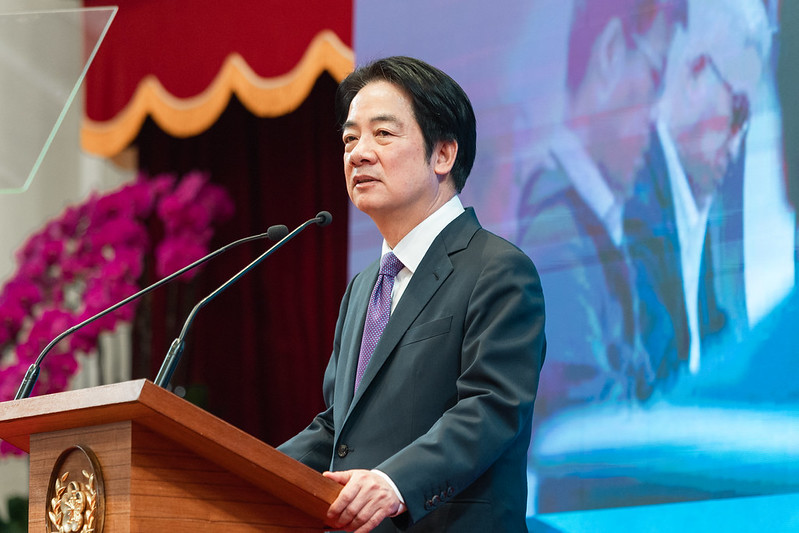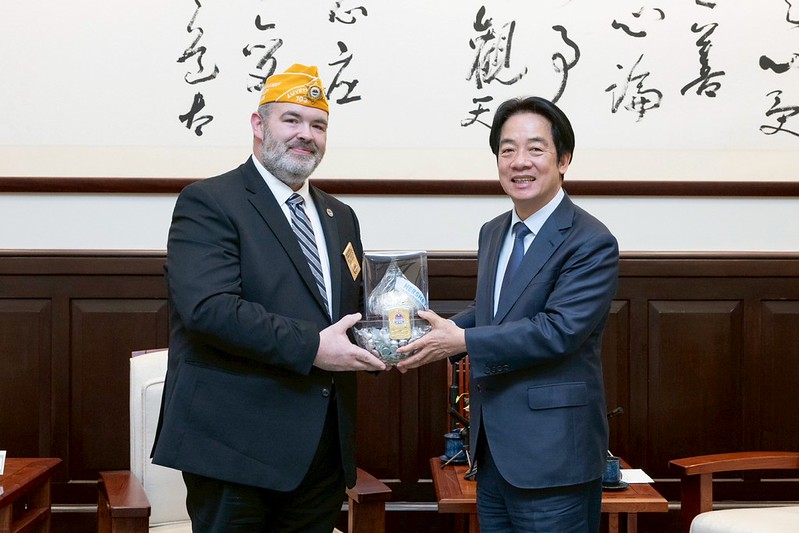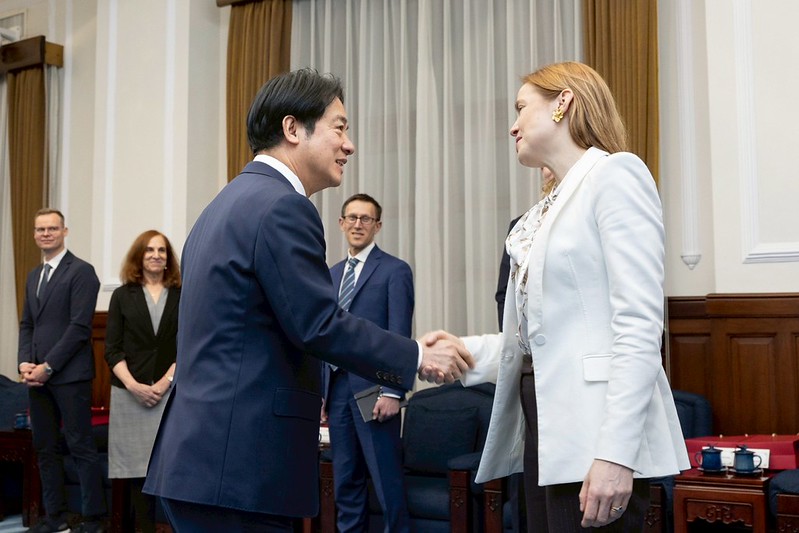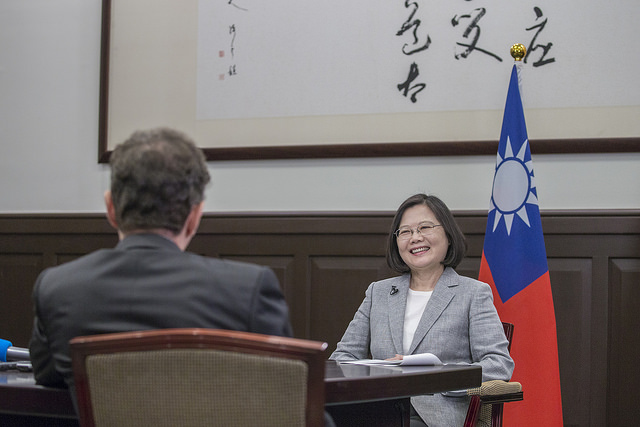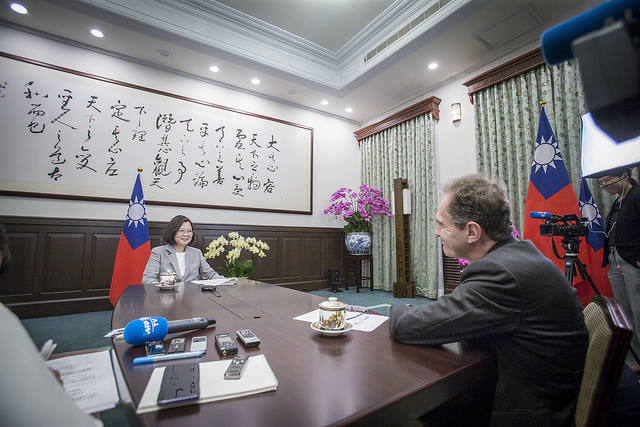News & activities
 News releases
News releases
During an interview with Agence France-Presse (AFP) on the morning of June 25, President Tsai Ing-wen responded to questions about Taiwan-US relations, cross-strait relations, Taiwan's international status and identity, and the summit between US President Donald Trump and North Korean leader Kim Jong-un.
A transcript of the interview questions with a translation of the president's responses follows:
Q: You said you've had some challenges since taking office. What is your next challenge?
President Tsai: During the 2016 elections, the voters of Taiwan had very high hopes and expectations for the future. In fact, 2016 was a challenging year for Taiwan and this led them to cast their votes with conviction. They had high expectations for the president and government elected in 2016 and wanted to see the changes they had hoped for as soon as possible. So for a president elected in 2016, time is a big challenge. We must race against time in order to carry out the necessary reforms – some of them fundamental reforms. For the president of Taiwan, the biggest challenge at this stage is time.
Furthermore, our society faces many trials, such as the pressure coming from China. How the president can uphold national dignity and sovereignty at the same time we maintain cross-strait peace remains another one of our biggest challenges.
For a long-time our economic development has been reliant on industrial manufacturing and OEM production. We must move towards the next phase of innovation, cutting-edge technology, and high-value industries to support our next phase of economic development. This sort of economic transition is very important for Taiwan. We are racing against time and all the other major economies of the world.
Separately, we are faced with the fact that Taiwan is a place with many natural disasters, particularly typhoons and earthquakes. So for us, nuclear energy is a choice with relatively more risk. At the same time, faced with the threat of climate change, the continued use of fossil fuels is also a challenge. Therefore, we must develop a new option, which is renewable energy. In the past, we lacked a good foundation for this so the rapid development of renewables presented difficulties for the government.
Another issue is the generational gap we are facing in Taiwan society. The younger generation and the middle-aged to older generation hold many values that are in conflict with each other. This is reflected in the income distribution and labor problems. The reason we spent such time and effort on pension reform is to maintain a balance between different generations.
Q: Of the reforms you mentioned, you didn't mention same-sex marriage. Is it something that you want to achieve in your first term or is it something that you're not pushing for that hard?
President Tsai: Same-sex marriage is also a reflection of the generational gap. In Taiwan, those above 40 tend to have different views to those under 40. However, the Grand Justices have already made a Constitutional interpretation, stating that marriage equality is Constitutionally-protected. All executive, legislative, and other branches of government must respect this ruling. So from a certain perspective, we have already completed one phase of this. Following this is the legislative process. We will bridge the differences society holds on this issue in order to propose a comprehensive bill.
Q: You use the words "pressure" and "peace." We'll get back to cross-strait relations later. What does Taiwan represent to you? How would you describe Taiwan to someone who knows very little about it?
President Tsai: If I were to describe Taiwan using one word I would say resilience. Taiwan is a place of limited resources. Over the centuries, it has gone through rule by different people. Therefore, one of the biggest challenges for every generation of Taiwanese has been how to survive. But over the centuries, the people have overcome these challenges to develop a very strong democracy and a solid economy. This shows that Taiwan is a very resilient place.
Let me put it this way. For example, following the Second World War, Taiwan went through a long period of authoritarian rule. However, this did not lead us to go through a period of bloodshed during our democratic transition. Instead, step-by-step, Taiwan developed into one of Asia's most vibrant and diverse democracies. Today, Taiwan is a model for the region and even the world. Without a period of bloodshed, Taiwan was able to build a very good democracy and attach great importance to freedom and the protection of human rights.
At the same time, Taiwan is a place more prone to natural disasters. We also lack natural resources. But despite this, we were able to nurture a high-quality work force, which has helped set a strong foundation for our economy. Today, we are moving towards the next generation of innovation-driven economic growth. So Taiwan's economic development is also a reflection of the resilience of the Taiwanese people.
The third part is Taiwan has a very large neighbor: China. Despite China's ongoing pressure, we have still managed to uphold our values of democracy and freedom. We are still willing to contribute proactively to international society – not just through government, but also through volunteerism. Taiwan's volunteers provide a lot of assistance throughout the world, and are widely-recognized for their ability to contribute wherever there are difficulties or natural disasters.
Q: Do you love Taiwan's democracy and freedom the most?
President Tsai: If I were to label Taiwan, I would label Taiwan as an island of resilience.
Q: Moving to political topics, I noticed that you often mention pressure from China. Would you say that the status quo in cross-strait relations has changed and that now there is more pressure from China than before?
President Tsai: We have been consistently withstanding pressure from China over the past two years. However, more recently, we have seen them take more aggressive actions that have impacted the status quo in the Taiwan Strait. It is not just the people of Taiwan that feel this way. I trust that the international community has seen China take many actions against Taiwan during this time, including military exercises, forcing airlines to change their designation of Taiwan, and more. This has given the international community a clear impression of how China is changing the status quo. They are threatening the balance that has existed for a long time between the two sides of the Taiwan Strait.
Q: How do you explain China's aggression over the past two years?
President Tsai: For the past two years, and even longer, China has grown increasingly aggressive. Of course, they want to stifle Taiwan in order to widen the distance between itself and Taiwan's democracy and freedom. But they also have regional ambitions. China wants to demonstrate its hegemony in the region. They want to show that they are able to dominate the security, economic, and other forces in the region. China's intentions should be very clear to the international community.
Q: You have solemnly stated that China's attempts to undermine Taiwan's sovereignty have challenged the island's bottom line. Can you elaborate on what the bottom line is?
President Tsai: I believe that the people of Taiwan share the same view of our bottom line. First is our democracy and freedom. Our free and democratic way of life cannot be infringed on. Second, Taiwan's sovereignty cannot be suppressed and has to be respected. Third, the people of Taiwan have the right to decide their own futures – and that right cannot be undermined.
Q: What countermeasures have you taken in response to that pressure?
President Tsai: We must continue to strengthen our democracy, economy, and national capacity to protect our country and the values we cherish.
But in addition to this, this is not just Taiwan's challenge; it is a challenge for the region and the world as a whole. Because today it's Taiwan, but tomorrow it may be any other country that will have to face the expansion of China's influence. Their democracy, freedom, and freedom to do business will one day be affected by China. We need to work together to reaffirm our values of democracy and freedom in order to constrain China and also minimize the expansion of their hegemonic influence.
Q: Aren't you disappointed by the attitude of the international community in that respect?
President Tsai: I think that the international community is starting to see China's intentions and ambitions very clearly. For the past few years, China's oppression against Taiwan has never stopped. However, we are also seeing more and more countries stand up, support, and speak out for Taiwan. For example, Taiwan wasn't able to attend this year's World Health Assembly because of obstruction from China. But, 24 countries spoke up on our behalf, including some non-diplomatic allies. We held over 60 bilateral meetings in Geneva and received widespread support. I think this is a very clear demonstration of the growing support for Taiwan at the WHA.
Q: On the topic of pressure from China, you said that one of your challenges is to develop Taiwan's economy. As we all know, Taiwan's economy depends on your relations with China. As such, how will you alleviate the pressure on the cross-strait relations and develop the economy at the same time?
President Tsai: First, China and Taiwan should have a common awareness that the development of businesses on either side of the Taiwan Strait is a positive thing. They shouldn't be subject to political interference. So, I would like to call on China to allow the economy to develop freely and for it to be free from political interference.
Second, Taiwan has to make its presence globally, not just in China. We have to develop other important markets and strengthen our strategic presence, particularly in Southeast Asian countries under our New Southbound Policy. We need to enhance our efforts in Southeast Asia, India, and other countries in the region that are full of market potential. At the same time, we will step up our cooperation in medicine, healthcare, agriculture, economic development, and talent exchanges, particularly in nurturing talent.
There are a lot of experiences Taiwan can share, which are very much needed by countries in Southeast Asia. Our economic development experience is highly complementary with theirs. So, under the New Southbound Policy, we will continue to strengthen those relations.
Furthermore, we have found that our trade and investment relations with European countries are also growing stronger. European countries are the number one investor in Taiwan today. Of course, we also have our traditional economic partners, including Japan and the US. Those relations continue to be very strong.
As a result, if we are better deployed around the world, we will be able to reduce China's economic influence both against us and the international community.
Q: With pressure from China growing, are you ready to meet with Chairman Xi Jinping or under what conditions would you meet with him?
President Tsai: I have mentioned on many occasions that as long as it is based on reciprocity, respect, and without political preconditions, as Taiwan's leader and president I will be willing – and have a responsibility – to meet with the leader of the other side. I would be willing to have an in-depth conversation of the challenges we share, as well as to share a better understanding of Taiwan's economy, society, and development with Chairman Xi. I trust that this will aid him in his policies and decision-making, in order to avoid misinterpretations or misunderstandings.
Q: Do you think that there is a chance that a meeting will happen in the near future?
President Tsai: I think this would depend on efforts of both parties, but we will continue to let the other side know that dialogue and communication is the most important way to resolve our issues. I hope that China can see the sincerity behind our willingness to talk. I also hope that China, as a responsible partner of the region, can be aware of their own responsibility and sit down and engage in conversation with Taiwan.
Q: Is this something you want to achieve this term? Is it one of your challenges?
President Tsai: Of course, I hope that during my term as president, there is a chance for both sides to sit down and talk. I believe that the meeting between US President Trump and DPRK Leader Kim Jong-un has provided a lot to think about. Their two countries are very far apart in terms of cultural values and other aspects, as well as the positions they hold. But they were able to sit down and talk on the basis of reciprocity and mutual respect in Singapore. I think this was a positive development for the international community. It is also an encouragement for countries that are at odds with one another.
Q: As for relations with the United States, how would you describe Taiwan-US relations?
President Tsai: In recent years, we have started to feel growing support for Taiwan from the US, including from the Executive Branch, Congress, and also the general public. In particular, over the past two years, Congress has taken measures that are very supportive of Taiwan. So I would say that overall, Taiwan-US relations are in a state of growth. This is a stable and friendly relationship.
Q: Do you want to strengthen Taiwan-US relations?
President Tsai: Yes, we look forward to continuing to strengthen our relations with the US and other like-minded countries.
Q: Do you have any plan for increasing your military capacity?
President Tsai: In the face of China's threats, we feel the need for us to improve our self-defense capabilities. This is why we have sped up our efforts to ensure our self-sufficiency in defense, including by investing more into research and development and the modernization of our military equipment. This is all ongoing right now.
Q: Do you think the benefit from closer ties with Washington outweighs the countermeasures from Beijing? Is it enough?
President Tsai: I think this is an issue of perspective. We have good friends that are close to us and others that are further from us. Our policy cannot be to ignore those who are closer to us in order to balance the feelings of those further away. What we hope is for those further away to come closer to us so that we can develop a friendlier relationship.
Q: You raised the Trump-Kim Summit as an example of how people can discuss their differences of opinion. Besides that, does this summit have any other significant implications to Taiwan and Asia as a whole?
President Tsai: I think the Trump-Kim Summit is a very important step for this region. In the Asia-Pacific, there are a number of key issues that require people in this region to work together to resolve. The Korean Peninsula – which has been one of the main instigators of tensions in Northeast Asia for a long time – is one such issue.
All of us have a common responsibility to maintain peace and stability in the region. The Trump-Kim Summit represents an effort to reduce tensions on the Korean Peninsula. For the region, this is a major encouragement and a positive development.
Q: What is the biggest threat to stability in the region? Is it China's expansion or North Korea's nuclear weapon plan?
President Tsai: I think that both things that you mentioned are factors leading to instability or represent threats to regional peace. While I am pleased to see the positive developments taking place on the Korean Peninsula, I also hope that China's expansion can take into account their position as a major power in the region, and their attitude towards maintaining peace, stability, and an atmosphere of respect in the region. This is the attitude that a major country in the region should have.
Q: Some countries regard China's expansion, including through the One Belt, One Road initiative, as a threat and not a benefit to the target countries. Do you agree with that or do you think it is good for peace and stability, and beneficial to everyone in the world?
President Tsai: It may be positive or it may be negative. It would have to depend on China. If China's Belt and Road initiative comes with good intentions, which is to assist the economic development of other countries, I trust that other countries will feel China's goodwill – and this will be a positive thing.
However, if there are ulterior motives behind China's Belt and Road initiative, such as an intention to interfere with their domestic politics or influence their strategic position, this may not be something that other countries would want to see. Because basically, every country wants to protect their sovereignty and their values, and avoid interference from a third country.
Q: Thus far, do you think that the One Belt, One Road initiative has had a positive or a negative impact?
President Tsai: I believe that this Belt and Road initiative is still in its initial phase, but we are already seeing many countries becoming more anxious and uneasy about it. I think that this reflects, in part, their suspicions about the intentions and motives of China.
Q: How do you see the growing relations and dialogue between the Vatican and China? Is this something that you fear?
President Tsai: We are watching this in a calm and rational manner. At the same time we are also paying close attention to some of the matters both parties seem to be more concerned about in the negotiations. I think that many countries, and international society at large, are watching the developments closely, because this will have an impact on the protection of religious freedom. This will be a chance to see to what extent China will be able to respect religious freedom. Major countries across the world are watching this closely and I think this is a chance for China to demonstrate their position on this issue.
Q: You mentioned that, despite the loss of certain diplomatic allies, you have enjoyed greater exchanges with the US, Japan, and many other countries. Do you believe that this trend will help you face the pressure from China? Has it upset China even more?
President Tsai: It is our responsibility to make sure that we are strong enough to face whatever challenges or pressure comes at us. This is our most important task as Taiwanese. But we also want to call on the international community to recognize the fact that the threat we face from China is also happening, to a certain extent, elsewhere around the world.
This is not just a threat Taiwan faces, but has far-reaching implications for the region and around the world. If the international community believes freedom and democracy are important values – universal values – then we have to stand together to protect those values. Working together, we have to give China pressure so that it will uphold its responsibilities as a major country in the region.
Q: You think that China is not a responsible superpower?
President Tsai: I hope that they will become aware of their responsibilities.
Q: So they're not?
President Tsai: I think that this is something that China has to think about themselves and come to a conclusion of their own.
Q: Would you like to talk about Taiwanese identity? How would you like Taiwan to be recognized globally?
President Tsai: Taiwan is a very unique place. Over the past couple hundreds of years, we have overcome a lot of challenges and threats to build a very strong democracy and economy, as well as a sound social structure. Overall, the people of Taiwan have created a distinct identity due to the challenges we have faced. This is our collective memory. It is something we are proud of. It is why the people of Taiwan choose to be recognized as Taiwanese. Our common memories, experiences, and values together make us Taiwanese.
Q: Has Taiwan's democratization caused you to become discouraged? As you improve ties with various countries, the world can better see how Taiwan is being isolated and how China is developing. Taiwan considers itself a model democracy and perhaps even deserves to be recognized for the fact, but yet it remains unacknowledged. Isn't this discouraging to you?
President Tsai: Of course there are times when we feel frustrated. But the Taiwanese people do not have the option of giving up. Over past centuries, through our resilience, we have overcome so much hardship and challenge. Of course, we also hope that the international community can support and encourage Taiwan. This is one of the reasons we're having this interview today.

